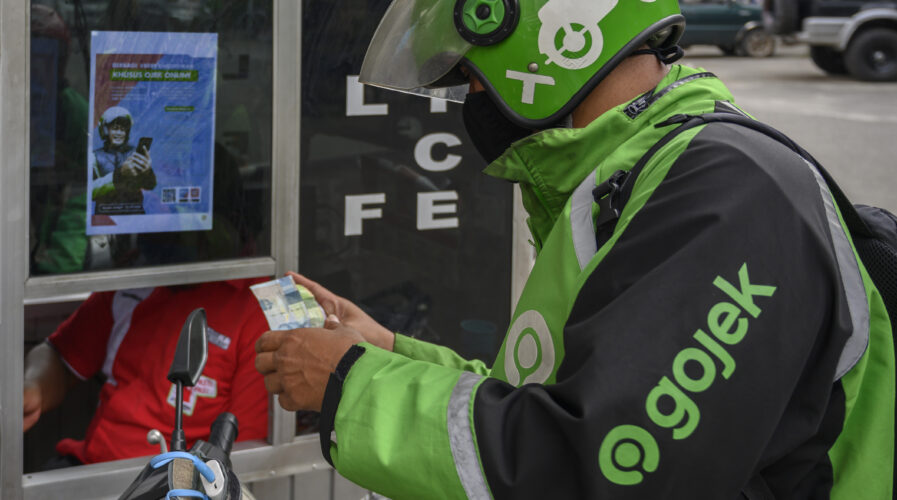
For Gojek, one size doesn’t fit all. (Photo by BAY ISMOYO / AFP)
For Gojek, one size doesn’t fit all
- For Severan Rault, Gojek is going through very exciting times, moving from startup to maturation
- In 2021, Indonesia’s ride-hailing and payments giant is aiming to tailor its services and content to individual customers’ needs
- The new CTO reckons competition would remain an important element to the unicorn’s continued growth
At a critical juncture, whilst Indonesia’s ride-hailing and payments giant Gojek was dealing with the fallout of the Covid-19 pandemic and competition from rival Grab, a new chief technology officer (CTO) Severan Rault was brought on board. From there on, Rault took charge of Gojek’s engineering teams in Southeast Asia and India.
“2020 was a challenging year, but we have continued to function, raising standards in the face of the new challenges,” Rault told Tech Wire Asia recently. “[We have] shifted our business well, quickly adapting to the ever-evolving consumer needs. It’s not too bad, I am pretty proud of the team and what we have been doing.”
Gojek, founded in 2010 as a motorcycle ride-hailing company, has transformed itself into a Southeast Asian “super app” offering everything from online payments to a roster of on-demand services. This includes transportation, e-commerce deliveries, healthcare services, and logistics. The company even recently added Facebook and PayPal to their list of high-profile investors, among Google and Tencent. Suffice to say, Gojek is a big deal in both the eastern and western tech hemispheres.
Many tech startups across the world went through belt-tightening in 2020 to survive and Gojek wasn’t exempt. The company was forced to cut 430 jobs or 9% of employees in June as it grappled with the economic fallout brought about by the pandemic. Many of the staff reductions hit Gojek’s newer divisions GoLife and GoFood Festivals – those hit hardest by the pandemic – and its household services and dining divisions were shuttered in July.
Competition & consolidation
The company disclosed that it has more than 170 million users, but it faces fierce rivalry from Grab, the other Southeast Asian on-demand ride-hailing and logistics platform that is also building out its own online financial services business. Grab is the larger company, valuing at US$14 billion. Earlier last year, reports emerged that the two were discussing a merger. That has since hit a roadblock.
The focus has then shifted to the merger discussions between Tokopedia and Gojek, which have also been in the works for a long time. Tokopedia is in advanced talks with Gojek for a US$18-billion merger deal, and that the two tech giants have signed a detailed term-sheet to conduct due diligence of each other’s business.
In terms of competition, Rault said, “We (Gojek) wants to give people what they need, only better, and cheaper. We want to be known for the great things we do for society. At the end of the day, the solution lies within what we can provide for our users.”
Rault also highlighted that Gojek this year, is focussing on understanding its customers individually. “It is what we are pushing for in 2021, on how can we provide services to each person that is tailored more towards their needs.”
He also believed that consolidation and competition are both vital for a healthy market. “The former sometimes makes more sense but the latter is important too. Competition is an important aspect”.
2021 and beyond
The new CTO agreed that it’s tough right now to come up with an outlook about what the future holds, but said remaining agile is key, while Gojek isn’t afraid of experimentation and exploring new markets.
“It is difficult to predict, I think we are going to be ready to adapt nevertheless, and there are reasons to be hopeful that the situation will get better soon. We are ready for any outcome.”
“I think success always comes after a series of failures. It is about how many experiments can we uptake in a short period of time in order to find what our consumer needs. Truth be told, Gojek is sort of in its adolescence heading to adulthood.
“In fact, we are experimenting with so many new things as we try to provide better value for our customers. There are myriads of problems that can be solved easily but there are also some that are complicated with new technologies,” said Rault.
Central to the success of those new ventures – and guiding how technology and sectors are explored and adopted – is how they contribute to building a relationship with customers, where they feel heard, he explained: “[…] we are trying new types of technologies in order to be able to curate services that cater to every user needs and wants.”
And that means an ever-growing reliance on understanding customers, using data and machine learning, artificial intelligence, and decision-making software.
What can businesses learn from Gojek success
From the beginning, Gojek has focused on, as the company writes on its website, improving “the welfare and livelihoods of the Indonesian people”. That means solving real problems. Additionally, the key to Gojek’s coming domination of Southeast Asia is how deeply it is embedded into its market, thoroughly understanding Indonesia, and tailors its services to the market.
Above all, Gojek enables an ecosystem of entrepreneurs, creating a platform that entrepreneurs and individual operators can use to reach new customers, build new skills, and increase profitability. The company’s ecosystem is ready to support Indonesia, both individual entrepreneurs and small businesses, to enter the digital economy by leveraging on its technology for their ventures.
Such an approach would allow micro, small, and medium enterprises to be able to go online and access a greater number of customers which will lead to an increase in their business transaction volumes. So businesses can consider robust inclusion, which is achievable by deeply understanding the challenges faced by MSMEs, and work towards effective solutions to address them.


